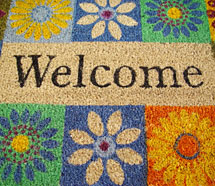When the three travelers, angels in disguise, came to visit Abraham, the ailing patriarch chose to disrupt a conversation with God in order to greet them (Gen. 18:1-2). Thus Chazal said that to receive lonely travelers on a hot day and give them water to drink, tell them to wash up and serve them food, is greater than being in the company and presence of the Almighty (Shabbat 127a). When the travelers bade Abraham farewell “and went toward Sodom” – this was after several hours, who knows how long? – “Abraham stood yet before the Lord” (Gen. 18:22). God waited for him, and Abraham was still in His presence.
 Why is showing care for guests, hachnasat orchim, so emphasized here? There are many ways to practice kindness. The cruelty of Sodom is portrayed in terms of cruelty to guests and strangers; in contrast, Abraham’s kindness expressed itself particularly in hachnasat orchim. Bear in mind that hachnasat orchim is often for the poor. A rich man is in no need of hospitality; he can find an inn or a place to stay. Yet hachnasat orchim differs from tzedakah, or material help to others, in a crucial way.
Why is showing care for guests, hachnasat orchim, so emphasized here? There are many ways to practice kindness. The cruelty of Sodom is portrayed in terms of cruelty to guests and strangers; in contrast, Abraham’s kindness expressed itself particularly in hachnasat orchim. Bear in mind that hachnasat orchim is often for the poor. A rich man is in no need of hospitality; he can find an inn or a place to stay. Yet hachnasat orchim differs from tzedakah, or material help to others, in a crucial way.
When one gives tzedakah, it demonstrates sympathy, but not a philosophy of human equality holding that all Jews are bnei melachim, princes, regardless of differences in wealth or knowledge. Hachnasat orchim, however, demonstrates full human equality, the fact that every being has his own dignity and is just as important as any other. It is much easier to give someone money and send him away than to invite him under your own roof. If I invite him in, that means that no matter what his station in life, I am treating him with respect, as an equal. Hachnasat orchim is symbolic of our personal relationships, and that is why the Torah gave us this picture of Abraham.
There were three travelers who came to visit the ailing Abraham: one to announce the birth of Isaac, one to destroy Sodom, and the third to heal Abraham (Bava Metzi’a 86b). Rashi (18:2), quoting the Midrash, explains that each angel is given only one assignment (Gen. Rabbah 50:2). (This is also true of human beings; we are each given but one assignment.) Let us understand the connection between the three angels.
God said, Will I hide from Abraham what I am going to do, seeing that Abraham shall surely become a great and mighty nation, and all the nations of the earth shall be blessed in him? For I know him, that he will command his children, and his household after him, and they shall keep the way of the Lord, to do righteousness and judgment; that the Lord may bring upon Abraham that which He has spoken of him. And the Lord said, Because the cry of Sodom and Gomorrah is great, and because their sin is very grievous… (Gen. 18:17-20).
Sodom was prosperous and had “dust of gold” (Job 28:6). As long as Sodom prospered, Abraham’s doctrines, sermonizing, and preaching meant nothing. One cannot preach goodness and kindness if malchut ha-rishah, the kingdom of evil, is rich and powerful. One cannot gain converts for an idea if its opponents, no matter how bad they are, prosper – are strong, respected, feared. An angel came to announce the birth of Isaac – in other words, the continuation of Abraham’s heritage. But Sodom’s existence contradicts everything Abraham has said. Abraham preaches equality, kindness, charity, and hospitality; Sodom laughs and scoffs at these ideas. Sodom is prosperous and mighty; Abraham is just one person. So when the angel came to tell Abraham that Isaac will be born and that his hopes will be fulfilled, another angel accompanied him to say that not only will Isaac be his successor, but his powerful opponent will be destroyed. This will strengthen his position, and people will begin to realize that evil does not pay. That is why the two angels came together.
And here the Torah tells us something important about Abraham. If we had been in his place, we would simply have prostrated ourselves and thanked God for destroying the kingdom of evil so that our task would be simplified. But Abraham pleaded for Sodom, knowing that its survival meant his own defeat. He was ready to accept defeat in order to give Sodom an opportunity to reform and restore itself. Abraham dropped his hatred for Sodom and his love for his mission. He was ready to sacrifice his life and have his new Torah appear to be a total failure. He was prepared to forgo his hopes and his vision for the future just so that Sodom would not be destroyed. This is chesed in the full sense of the word.
Excerpted from Abraham’s Journey: Reflections on the Life of the Founding Patriarch by Rabbi Joseph B. Soloveitchik.
??More information on the book can be found here: www.ou.org/books


